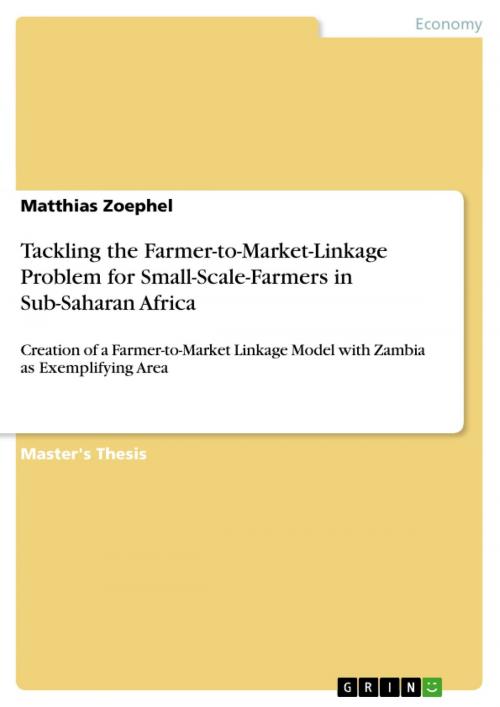Tackling the Farmer-to-Market-Linkage Problem for Small-Scale-Farmers in Sub-Saharan Africa
Creation of a Farmer-to-Market Linkage Model with Zambia as Exemplifying Area
Business & Finance, Economics, Urban & Regional| Author: | Matthias Zoephel | ISBN: | 9783640903207 |
| Publisher: | GRIN Publishing | Publication: | April 29, 2011 |
| Imprint: | GRIN Publishing | Language: | English |
| Author: | Matthias Zoephel |
| ISBN: | 9783640903207 |
| Publisher: | GRIN Publishing |
| Publication: | April 29, 2011 |
| Imprint: | GRIN Publishing |
| Language: | English |
Master's Thesis from the year 2011 in the subject Economics - Case Scenarios, grade: A, University of Applied Sciences Chur, language: English, abstract: African small-scale farmers are inadequately linked to markets to sell their harvested produce. On the one hand this is mainly because farmers are unable to produce according to what is demanded by buyers and on the other hand due to intermediary constraints. This current lack of adequate market linkages prevents farmers to sell their surplus production profitably. While this problem has been widely recognized by NGOs and governmental institutions, little improvements have been made so far. Literature fails to provide an overview of this problem that includes all variables affecting farmers and their linkage to markets. Zambia in particular has received minor consideration in the current literature concerning this problem. Therefore, two NGOs, namely Henwood Foundation and NAK Karitativ, have chosen this Master Thesis to create a farmer-to-market linkage model that incorporates all variables affecting farmers from being inadequately linked to markets while focus is placed on those variables that are amendable to influence by NGOs rather than external variables. The literature review in the following section two indicates how severe the market linkage problem actually is for small-scale farmers and what possibilities there are to tackle this dilemma. Based on the literature review, the research problem, its goal and its objectives as well as the data collection methods are specified in section three. Section four will provide an introduction to Zambia as well as to Western Province, a state in Zambia, and to Mongu District, a region in Western Province which received the geographical focus of this thesis. Building on this, the farmer-to-market linkage model will receive attention. Section five and six point out preconditions that determine agricultural output, which ultimately decides how well farmers can be linked to markets. Also, actual markets and their demand structure are stated in these sections. Based on sections five and six, the final farmer-to-market linkage model is developed and subsequently discussed in section seven. The thesis concludes with some incitation to solve this dilemma in section eight and a final conclusion outlining limitations of this study and suggestions for further research in section nine.
Master's Thesis from the year 2011 in the subject Economics - Case Scenarios, grade: A, University of Applied Sciences Chur, language: English, abstract: African small-scale farmers are inadequately linked to markets to sell their harvested produce. On the one hand this is mainly because farmers are unable to produce according to what is demanded by buyers and on the other hand due to intermediary constraints. This current lack of adequate market linkages prevents farmers to sell their surplus production profitably. While this problem has been widely recognized by NGOs and governmental institutions, little improvements have been made so far. Literature fails to provide an overview of this problem that includes all variables affecting farmers and their linkage to markets. Zambia in particular has received minor consideration in the current literature concerning this problem. Therefore, two NGOs, namely Henwood Foundation and NAK Karitativ, have chosen this Master Thesis to create a farmer-to-market linkage model that incorporates all variables affecting farmers from being inadequately linked to markets while focus is placed on those variables that are amendable to influence by NGOs rather than external variables. The literature review in the following section two indicates how severe the market linkage problem actually is for small-scale farmers and what possibilities there are to tackle this dilemma. Based on the literature review, the research problem, its goal and its objectives as well as the data collection methods are specified in section three. Section four will provide an introduction to Zambia as well as to Western Province, a state in Zambia, and to Mongu District, a region in Western Province which received the geographical focus of this thesis. Building on this, the farmer-to-market linkage model will receive attention. Section five and six point out preconditions that determine agricultural output, which ultimately decides how well farmers can be linked to markets. Also, actual markets and their demand structure are stated in these sections. Based on sections five and six, the final farmer-to-market linkage model is developed and subsequently discussed in section seven. The thesis concludes with some incitation to solve this dilemma in section eight and a final conclusion outlining limitations of this study and suggestions for further research in section nine.















